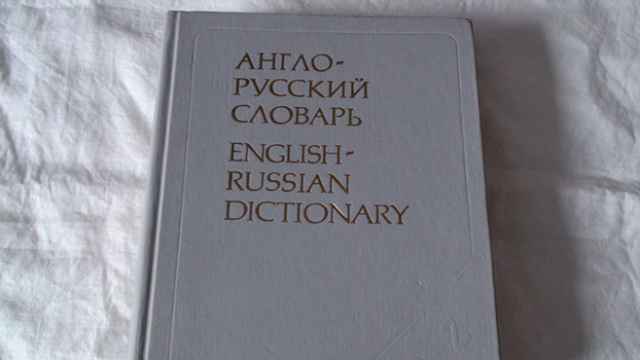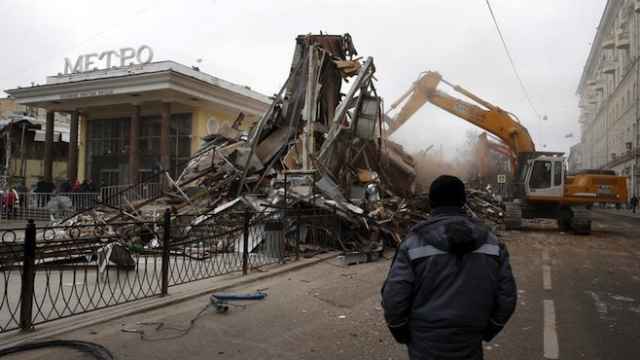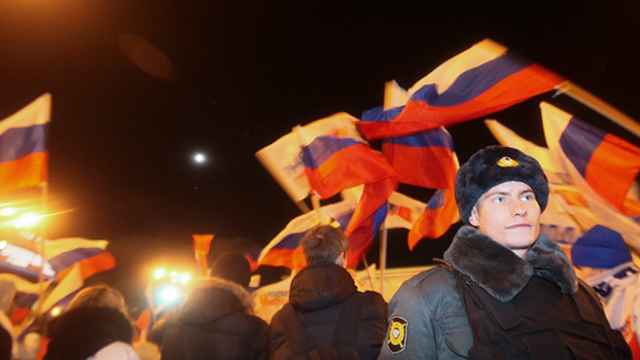
I haven't been very hopeful about the negotiations in Syria, particularly last week when Syrian President Bashar Assad was quoted as saying, "Regarding a cease-fire, a halt to operations, if it happens, it doesn't mean that each party will stop using weapons." I mean, isn't the definition of a cease-fire when each party stops using weapons?
Perhaps, I thought, it's a translation problem. And it might be. I can't comment on the Arabic, but I spent a few hours learning how to stop fighting in Russian and English. It's not as simple as I thought.
I thought the Russian word used for cease-fire in these documents and discussions was перемирие. Перемирие is an interesting word, one of only a few examples of the prefix пере- meaning a kind of break or in-between time, like передышка (a breather, a break to catch your breath, a respite, from дышать — to breathe); перекус (a snack, an in-between meal, from кушать — to eat); and the holiest of holies in the office: перекур (a smoke break, i.e., a time to go outside and gab with your friends, from курить — to smoke). Following this pattern, перемирие is peace break — a time of peace in between fighting, a cease-fire.
Перемирие, it turns out, is an enormously complicated thing: временное прекращение военных (боевых) действий по соглашению воюющих сторон (the temporary cessation of military [combat] activities by agreement of the warring parties). You can sign off on общее перемирие на всём театре военных действий (a general cease-fire in the entire operational theater). Or it can be местное перемирие на отдельном его участке (a localized cease-fire in one part of the operational theater).
And there is a whole batch of standard and optional conditions that go with this kind of cease-fire, like прекращение всех наступательных действий (cessation of all offensive actions) and действия оборонительные считаются дозволенными (actions taken in defense are considered permissible).
But when I pulled up the official Russian and English texts of the agreement, the word перемирие was nowhere to be seen. What's being negotiated is прекращение боевых действий в Сирии (сessation of hostilities in Syria). As far as I can tell, прекращение боевых действий (cessation of hostilities) is way down the agreement ladder, quite circumscribed, and has a gazillion conditions that need to be met.
Sometimes the translation of those conditions struck me as being somewhat inexact, as if the translators were trying to make each other's side happy without actually changing the terms. For example, the English document stipulates that the signatories agree to stop attacking the "Armed Forces of the Syrian Arab Republic, and any associated forces." In Russian, this вооруженные силы Сирийской Арабской Республики и силы, оказывающие им поддержку (Armed Forces of the Syrian Arab Republic and forces providing support to them." The sides also have "to refrain from acquiring or seeking to acquire territory from other parties to the cease-fire." In Russian these parties are другие стороны, участвующие в прекращения огня (other parties taking part in the cessation of hostilities.) One man's cease-fire is another man's...
I also looked for the word гарант (guarantor), which is what the U.S. and Russia are supposed to be calling themselves. Those words don't appear anywhere. But both sides are definitely готовы сотрудничать (prepared to work together).
Which is great. Let's just not oversell this.
Michele A. Berdy, a Moscow-based translator and interpreter, is author of "The Russian Word's Worth" (Glas), a collection of her columns.
A Message from The Moscow Times:
Dear readers,
We are facing unprecedented challenges. Russia's Prosecutor General's Office has designated The Moscow Times as an "undesirable" organization, criminalizing our work and putting our staff at risk of prosecution. This follows our earlier unjust labeling as a "foreign agent."
These actions are direct attempts to silence independent journalism in Russia. The authorities claim our work "discredits the decisions of the Russian leadership." We see things differently: we strive to provide accurate, unbiased reporting on Russia.
We, the journalists of The Moscow Times, refuse to be silenced. But to continue our work, we need your help.
Your support, no matter how small, makes a world of difference. If you can, please support us monthly starting from just $2. It's quick to set up, and every contribution makes a significant impact.
By supporting The Moscow Times, you're defending open, independent journalism in the face of repression. Thank you for standing with us.
Remind me later.








